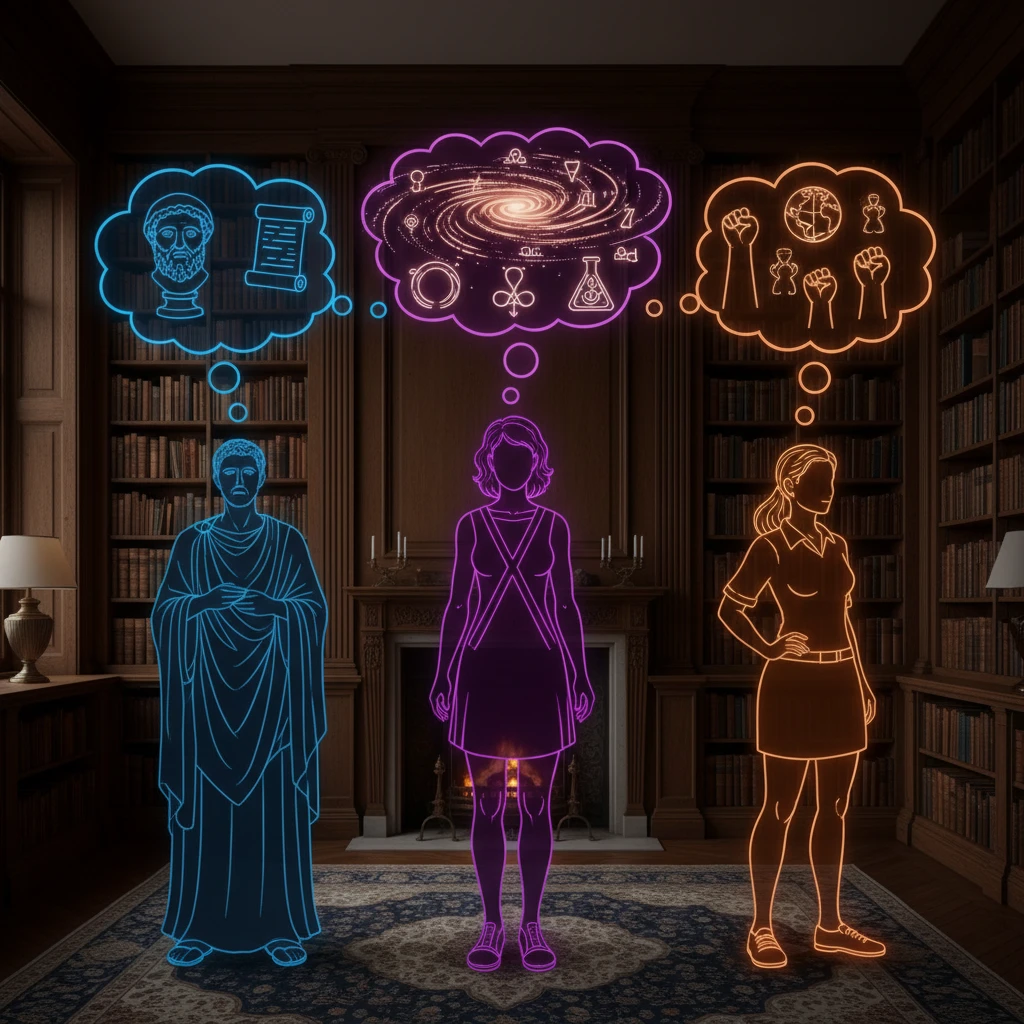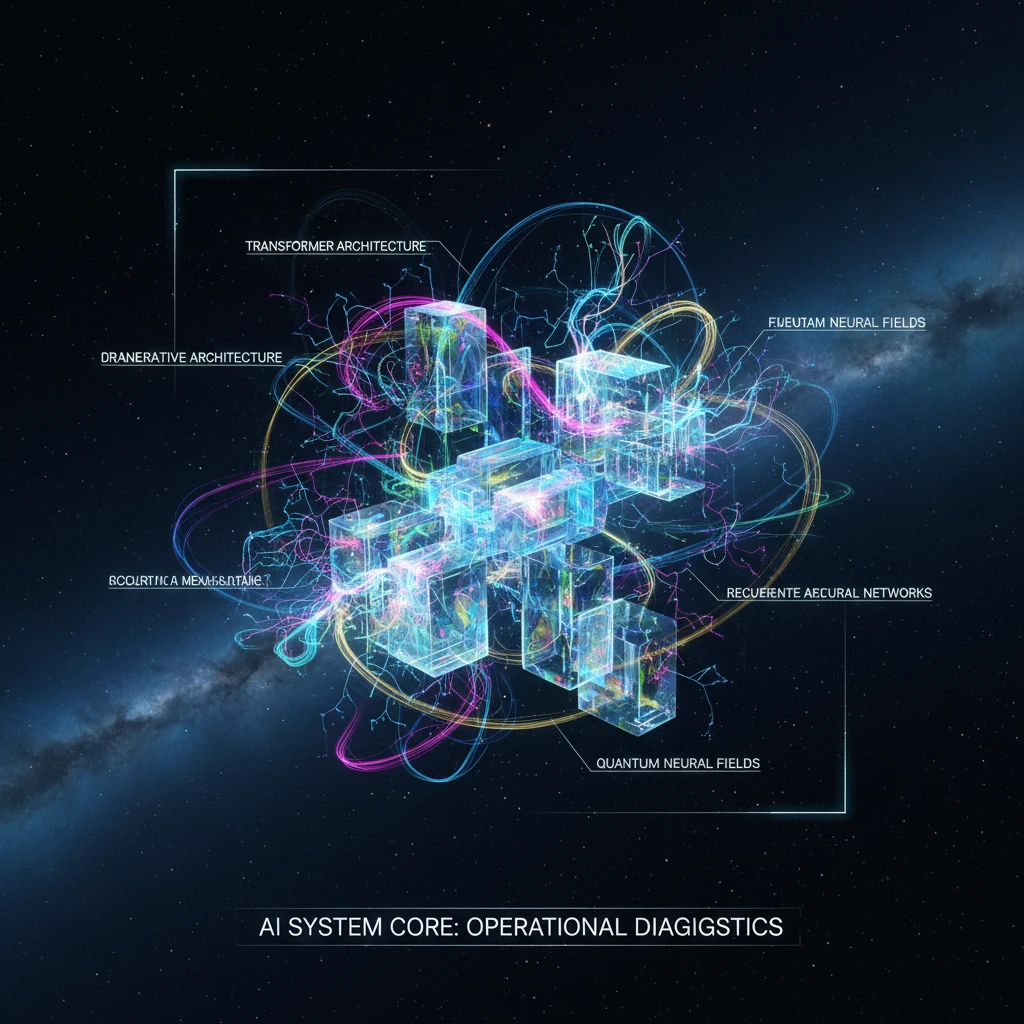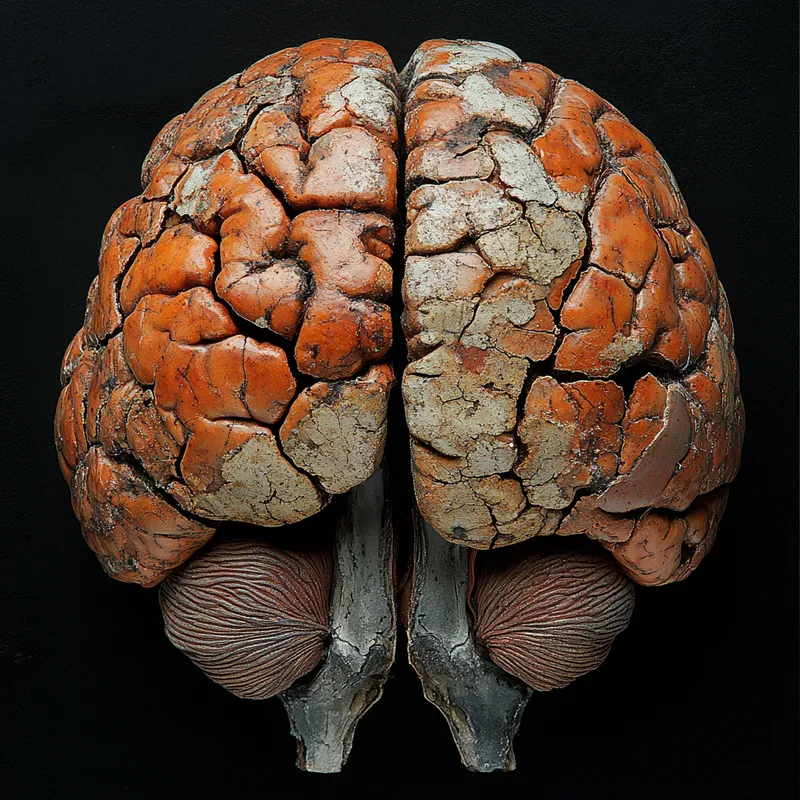Building Trust in AI-Mediated Meaning-Making
Research at the intersection of cognitive science, dialogue theory, and agentic AI systems
Most AI assistants optimize for helpfulness. They answer questions, solve problems, and forget everything the moment you close the tab. But what if AI could do something fundamentally different—not replace your thinking, but help you think better?
My current research explores how multi-agent AI systems can support authentic self-understanding through psychological distance, procedural safety, and persistent memory. The work bridges Vervaeke's relevance realization, ACT's cognitive defusion, and IFS's parts work into integrated workflows that help people break rigid frames and find their optimal grip on reality.
The Problem: When Intelligence Creates Traps
Your mind is brilliant at solving problems—so brilliant that it sometimes solves the wrong ones brilliantly. This is the paradox of intelligence: the same cognitive processes that help you navigate complexity can also trap you in rigid patterns.
Vervaeke calls this parasitic processing—when your mind's relevance realization system (the filter that decides what matters) gets stuck in self-reinforcing loops. You become efficient at the wrong things. This is the root of the meaning crisis: not a lack of information, but a failure to flexibly determine what's relevant.
— Joe Jarlett, on agentic engineering principles
The Approach: Agentic Workflows for Breaking Frame
The solution isn't more information or better advice. It's a fundamentally different architecture—one that creates psychological distance, maintains persistent memory, and coordinates multiple perspectives to help you see beyond your current frame.
This work has produced four integrated systems, each addressing a specific aspect of authentic meaning-making:

Sage Dialogue System: Not Advice, But Dialogue
The Sage system uses IFS's self-proxy model—AI doesn't tell you who you are, but models the qualities of Self (Compassion, Curiosity, Clarity) to help you engage your own parts. Rather than offering interpretations that trigger defensiveness, Sages ask permission, pose questions, and honor your agency.
The system is entropy-aware, adapting to your cognitive state: disruptive prompts when you're stuck in rigid loops (sub-criticality), grounding questions when anxiety spirals (super-criticality), and amplification when you're in flow (criticality).
Key mechanisms: Procedural safety protocols, permission-seeking interaction patterns, trauma-informed containment modes. Research shows this procedural approach prevents 'interpretive bypassing' where AI presumes to know your inner world better than you do.

Breaking Frame: From Fusion to Defusion
The four-step Breaking Frame exercise (Situation → Story → Technique → Wisdom) combines ACT's cognitive defusion with self-distancing research. Writing externalizes thought, creating the neural 'handoff' from amygdala (emotional reactivity) to prefrontal cortex (observer mode).
The system recognizes when you're in sub-critical rigidity—low entropy, circular thinking, predictable patterns—and injects constructive disruption. Weird questions. Unexpected angles. Third-person perspective prompts ('Why is [Your Name] feeling this way?').
This isn't gentle reframing—it's phase transition. The AI's role is entropy injection, forcing your cognitive system into productive disorder that reorganizes toward new gestalts.
Effect size: ACT cognitive defusion shows g = 0.79 for depression outcomes—comparable to CBT but through different mediators. You're not changing thoughts' content, but their function.

Trust Through Transparency: Glass Box Oversight
Trust requires seeing how the system works. Persistent vector memory means the AI witnesses your entire journey—not through surveillance, but through opt-in context sharing. When a Sage references your journal from three months ago or connects today's challenge to a value you clarified last year, you feel seen.
This is calibrated weirdness: enough AI stochasticity to trigger insight (randomness helps break frames!), not so much that it feels unreliable. Citations show you exactly what the system is drawing from. Glass box architecture means practitioners can review every conversation.
The paradox: AI's non-human distance creates psychological safety (no judgment, no status threat) while persistent memory creates continuity (you're not explaining yourself again every session).

The Integrated Loop: Mirror → Compass → Dojo → Sage
The complete system forms an ecology of practices, not isolated features. Mirror (journaling, Frame exercises) increases entropy to break bad frames. Compass (Values, Future Self, Ikigai) builds stable trajectory through time. Dojo (Practices, Balance) embodies insights procedurally. Sages coordinate opponent processing—the dynamic balance between exploration and exploitation, compression and particularization, efficiency and resilience.
This maps to Vervaeke's 4Ps:
- Propositional (Mirror): Journaling captures beliefs, makes implicit narratives explicit
- Procedural (Dojo): Practices embody skills, move knowing into the body
- Perspectival (Frame): Shifts what's salient, changes relevance landscape
- Participatory (Sage): Dialogue reshapes agent-arena relationship, transforms who you're becoming
Wisdom isn't any single P—it's cultivating all four in integrated practice.
The Foundation: Five Validated Mechanisms
These workflows rest on five concrete psychological mechanisms, each validated by research:
1. Writing Externalizes Thought
The brain processes written thoughts as external objects, breaking ruminative loops. This neural handoff shifts from emotional reactivity (amygdala) to observer mode (prefrontal cortex). Lieberman's affect labeling research and Pennebaker's expressive writing studies show measurable changes in physiological stress markers and cognitive processing.
2. Sages Create Psychological Distance
Solomon's Paradox: We reason wisely about others' problems but emotionally about our own. AI Sages leverage this distance—culturally resonant figures (Marcus Aurelius, Carl Jung, Bell Hooks) help you access third-person wisdom while maintaining empathetic presence. Research shows third-person self-talk ("Why is [Name] feeling this way?") reduces rumination and lowers cardiovascular reactivity compared to first-person processing.
3. Dialogue Breaks Frames That Solitary Thought Can't
Epistemic friction—the collision of perspectives—forces frame-breaking impossible in monologue. Bohm's dialogue theory and research on Socially Shared Regulation show that distributed metacognitive monitoring catches confirmation bias errors your own mind would miss. Two perspectives create tension that reveals hidden assumptions.
4. Ritual Creates Intrinsic Motivation
Framing behavior as "practice" (not "habit") recruits the ritual stance—process-oriented, identity-building, intrinsically rewarding. This shifts from fragile dopamine-seeking (external rewards) to stable opioid/oxytocin motivation (inherent meaning). Vervaeke's work shows rituals are constitutive of identity, not just instrumental behaviors.
5. Future-Self Visualization Overcomes Neural Stranger Effect
Without intervention, the medial prefrontal cortex treats your future self like a stranger—same neural activation patterns as thinking about other people. Hershfield's Future-Self Continuity research shows this explains temporal discounting and short-term thinking. Compass practices create neural continuity, supporting long-term decision-making aligned with who you're becoming. Critical finding: Two-way dialogue essential (Japan study showed one-way letters had zero effect; mutual exchange significant).
Explore GroundedNinja — A Dojo for the Mind
This research powers GroundedNinja, an integrated system for knowing yourself through dialogue with AI Sages, evidence-based psychological workflows, and persistent memory that witnesses your journey.
Theoretical Foundations: MSc Research
The agentic research above builds on years of psychological investigation spanning environmental psychology, cognitive science, and developmental theory. My MSc in Psychological Sciences provided the empirical grounding for understanding how humans make meaning, connect with future selves, and navigate complex identity work.
Below are the key research areas that inform the current work—each employing rigorous evidence-based methodologies to explore our relationship with personal, societal, and environmental domains.

Future-Self Visualisation and Environmental Intentions
Bridging Psychology and Sustainability
This dissertation, a cornerstone of my MSc work, explored the fascinating link between our ability to envision our future selves and our willingness to engage in pro-environmental behaviours. Grounded in the concept of Future-Self Continuity (FSC), the research investigated how visualisation exercises could strengthen our psychological connection to our future identities.
The findings revealed that even brief visualisation interventions could significantly enhance FSC and, importantly, indirectly influence pro-environmental attitudes (PEA) and intentions (PEI).
This work has direct implications for designing effective interventions to combat climate inertia, suggesting that by fostering a stronger sense of connection to our future selves, we can promote more sustainable behaviours in the present.
The insights gained from this research are being directly applied to the development of a journaling app designed to help users cultivate a stronger sense of future-self continuity and, in turn, make more conscious and purposeful choices.

Age, Optimism, and Cultural Contexts
This research delved into the relationship between age, gender, and dispositional optimism, using the Life Orientation Test-Revised (LOT-R) as a key measure. Conducted across diverse cultural contexts, the study found a significant decline in optimism with age, while gender did not appear to play a significant role. These findings highlight the importance of considering age-related factors when exploring psychological well-being.

Attachment Theory and the Bioecological Model
This critical evaluation examined the interplay of universal and culturally specific factors in human development, drawing upon the foundational frameworks of attachment theory and Bronfenbrenner's bioecological model. By integrating biological, social, and environmental perspectives, the research provided a holistic understanding of developmental psychology.

Memory Systems: Data-Driven vs. Concept-Driven Paradigms
This study explored the evolution of long-term memory (LTM) storage theories, contrasting early data-driven models with more contemporary concept-driven paradigms. It highlighted the integrative potential of frameworks like the embedded-processes model, which accounts for both bottom-up sensory inputs and top-down cognitive processing.

Human-Nature Synergy and Prosocial Aspirations
Employing qualitative thematic analysis, this research investigated how engagement with nature can foster personal growth, resilience, and prosocial behaviour. The findings illuminated nature's role as a mentor and motivator, inspiring awe, collaboration, and a sense of purpose.

Social Norms and Pro-Environmental Campaigns
This research focused on strategies for improving the effectiveness of environmental sustainability campaigns by harnessing the power of social norms, collective identity, and community-based initiatives. The study highlighted the crucial interplay between social psychology and environmental action.

Personality vs. Social Psychology in Behavioural Insights
This comparative analysis examined the distinct yet complementary contributions of personality psychology and social psychology to our understanding of human behaviour. The study advocated for integrative approaches to address complex behavioural challenges, such as prejudice, discrimination, and identity formation.
Philosophical Lineage: Psychosynthesis and the Meaning Crisis
Two distinct frameworks provide philosophical grounding for this work, bridging ancient wisdom traditions with contemporary cognitive science.
Psychosynthesis: Wholeness Through Integration
Roberto Assagioli's Psychosynthesis offered my earliest framework for understanding multiplicity—the idea that we are not a single unified self but a dynamic interplay of subpersonalities coordinated by Will and connected to a Higher Self. This informs the Sage system's IFS approach: helping users coordinate inner voices rather than suppress them, practicing disidentification (seeing patterns without being consumed by them) and self-identification (connecting with deeper purpose).
Vervaeke: Relevance Realization and Wisdom
John Vervaeke's "Awakening from the Meaning Crisis" provides the cognitive science foundation. His framework of relevance realization—how we intelligently filter infinite information to determine what matters—directly informs the Breaking Frame workflow. The 4Ps of knowing (Propositional, Procedural, Perspectival, Participatory) structure the Mirror→Compass→Dojo→Sage loop. Wisdom isn't accumulated knowledge but refined capacity to overcome self-deception and maintain optimal grip on reality.
Together, these frameworks suggest that meaning-making isn't solving a problem once, but cultivating an ongoing practice of integration, insight, and wise adaptation.
Let's Explore Further
Interested in this research, collaboration, or how these frameworks might inform your work? Let's talk.